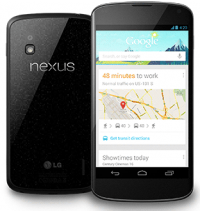T-Mobile or AT&T? 8GB or 16GB? It's almost decision time for the Nexus 4

Believe it or not, I've never had an unlocked phone. Rooted, yes, factory unlocked, no. I'm not alone in this, of course. Most of us in the States buy our phones locked down by carriers, tied to a lengthy contract, and, in exchange, heavily subsidized and much more affordable than they are in other countries. Google's Nexus 4, however, is set to change that, both for me and for a whole lot of other smartphone buyers. With a sale price as low as $299, the 8GB version of Google's new superphone is a steal and it comes quite considerately unlocked.

A couple weeks ago, I decided to leave wireless contract land, terminate my Verizon contract, and snag a Nexus 4. With the Nexus 4 going on sale shortly (we know it will be today, but Google has done a much better job keeping the actual time under wraps than they did the phone's design), it's time to decide just where I'm going to take this unlocked phone to actually hook it up to a network.
But first, I need to decide if I'm going for the 8GB ($299) or 16GB ($349) model. The consensus among most reviewers and pundits is that 8GB is woefully small. In fact, the lack of expandability has been one of the key criticisms of the new phone. However, I stumbled across an article today on AndroidCentral, where the author makes a great point about the 8GB model:
One day we'll see smartphones with terabytes of storage, but until then I have to use the cloud. I know I'm not the only one. You're still going to need the cloud if you have a lot of media, there is no way around it...
I guess I could give Google the extra $50 [for the 16GB model], and still not have enough storage, but instead I'll use it to pay for next month's service, or a trip to the movies with my wife. There's a case to be made for buying the 8GB version, and I fit that case.
And he's right. Google left out the SD card slot for a reason. Not only does it add cost, weight and complexity, but it's sort of irrelevant in Google-land. Google exists because of the Internet and the cloud. Local storage is so 2008. I'm with the AndroidCentral columnist. Give me the 8GB model and my wife will be $50 less mad at me for buying yet another computing device. In fact, by selling my Droid Razr and an old second-gen iPad on Gazelle, I can cover the $299 8GB Nexus 4 completely. For that matter, if I sell my Nexus 7, I can almost cover my Verizon early termination fee (and who really needs a 7" tablet when your phone is pushing 5" anyway?).
So there's one decision down. The 8GB model will do the trick.
Now for a tougher question. What carrier? Verizon has great coverage in my area and the only regret I have about leaving them is that I'll hit more dead spots in my neck of the woods (and when I say woods, I mean it literally). AT&T has reasonable coverage out my way, but is quite a bit more expensive. T-Mobile coverage is spotty at best near my house, but has a growing footprint. Where coverage exists, it's as fast as you can get on a non-LTE phone and I'm increasingly spending time for work in Boston and New York. Google Voice and various VoIP apps mitigate coverage issues a bit, too, since calling over any WiFi or carrier data network looks pretty much the same with the right software. It's certainly a non-issue at home since my Google Voice number rings my business line, my home phone, and my cell phone.
AT&T and T-Mobile aren't the only options, though, for GSM phones. There are a number of pre-paid carriers that utilize the AT&T and T-Mobile networks but resell data/voice services, usually at a discount. Since they resell service from the two major GSM carriers, coverage issues don't change, but clearly it isn't necessary to go directly through AT&T. There's an interesting roundup of pre-paid providers that support the Nexus 4 on geek.com which certainly favors the T-Mobile resellers (and T-Mobile actually wins the comparison with its pre-paid plan), largely because of reasonable data caps before throttling kicks in and the higher speeds available where HSPA+ services are available.
So in spite of the poor coverage in my area, I'm going to hop on T-Mobile's $30/month pre-paid plan. When I'm within range of WiFi, I'm not overly concerned about data coverage, and when I'm on the road (where data coverage is generally very good), I want the fastest speeds I can achieve. The $30 plan only includes 100 minutes of talk time, but prodigous use of VoIP should make that a non-issue as well. $15/month adds hotspot capabilities. Count me in. Of course, the beauty of an unlocked phone is that if T-Mobile doesn't end up suiting my needs, I can go elsewhere, no harm, no foul.
And speaking of counting, I, like many other Google nerds, am counting down until the "Notify me" button switches to "Add to cart" on the Google Play Store.